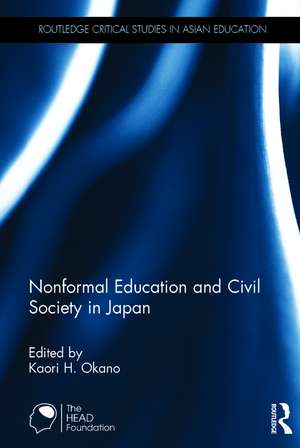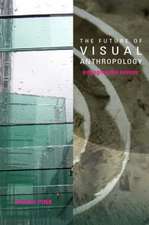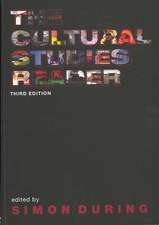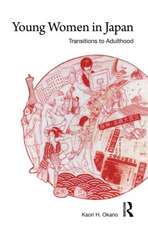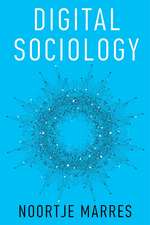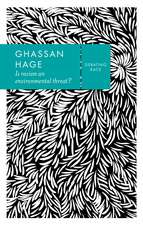Nonformal Education and Civil Society in Japan: Routledge Critical Studies in Asian Education
Editat de Kaori H. Okanoen Limba Engleză Hardback – 15 sep 2015
In the last two decades nonformal education has rapidly increased in extent and significance. This is because individual needs for education have become so diverse and rapidly changing that formal education alone is unable to satisfy them. Increasingly diverse demands on education resulted from a combination of transnational migration, heightened human rights awareness, the aging population, and competition in the globalised labour market. Some in the private sector saw this situation as a business opportunity. Others in the civil society volunteered to assist the vulnerable. The rise in nonformal education has also been facilitated by national policy developments since the 1990s.
Drawing on case studies, this book illuminates a diverse range of nonformal education activities; and suggests that the nature of the relationship between nonformal education and mainstream schooling has changed. Not only have the two sectors become more interdependent, but the formal education sector increasingly acknowledges nonformal education’s important and necessary roles. These changes signal a significant departure from the past in the overall functioning of Japanese education. The case studies include: neighbourhood homework clubs for migrant children, community-based literacy classes, after-school care programs, sport clubs, alternative schools for long-term absent students, schools for foreigners, training in intercultural competence at universities and corporations, kôminkan (community halls), and lifelong learning for the seniors. This book will appeal to both scholars of Japanese Studies/Asian Studies, and those of comparative education and sociology/anthropology of education.
| Toate formatele și edițiile | Preț | Express |
|---|---|---|
| Paperback (1) | 442.50 lei 43-57 zile | |
| Taylor & Francis – 12 oct 2017 | 442.50 lei 43-57 zile | |
| Hardback (1) | 1054.71 lei 43-57 zile | |
| Taylor & Francis – 15 sep 2015 | 1054.71 lei 43-57 zile |
Din seria Routledge Critical Studies in Asian Education
-
 Preț: 364.17 lei
Preț: 364.17 lei -
 Preț: 303.50 lei
Preț: 303.50 lei -
 Preț: 341.63 lei
Preț: 341.63 lei -
 Preț: 303.89 lei
Preț: 303.89 lei -
 Preț: 442.50 lei
Preț: 442.50 lei - 18%
 Preț: 1057.09 lei
Preț: 1057.09 lei - 18%
 Preț: 1004.86 lei
Preț: 1004.86 lei - 12%
 Preț: 292.72 lei
Preț: 292.72 lei -
 Preț: 442.50 lei
Preț: 442.50 lei - 12%
 Preț: 292.99 lei
Preț: 292.99 lei - 18%
 Preț: 997.11 lei
Preț: 997.11 lei -
 Preț: 422.59 lei
Preț: 422.59 lei -
 Preț: 402.66 lei
Preț: 402.66 lei - 14%
 Preț: 292.99 lei
Preț: 292.99 lei - 14%
 Preț: 292.72 lei
Preț: 292.72 lei - 12%
 Preț: 292.08 lei
Preț: 292.08 lei - 18%
 Preț: 1000.27 lei
Preț: 1000.27 lei -
 Preț: 477.02 lei
Preț: 477.02 lei - 18%
 Preț: 1000.27 lei
Preț: 1000.27 lei -
 Preț: 439.41 lei
Preț: 439.41 lei -
 Preț: 442.50 lei
Preț: 442.50 lei -
 Preț: 442.50 lei
Preț: 442.50 lei - 18%
 Preț: 1002.68 lei
Preț: 1002.68 lei - 13%
 Preț: 290.00 lei
Preț: 290.00 lei - 18%
 Preț: 1000.27 lei
Preț: 1000.27 lei -
 Preț: 399.79 lei
Preț: 399.79 lei -
 Preț: 406.37 lei
Preț: 406.37 lei - 18%
 Preț: 1000.27 lei
Preț: 1000.27 lei -
 Preț: 473.71 lei
Preț: 473.71 lei
Preț: 1054.71 lei
Preț vechi: 1286.24 lei
-18% Nou
Puncte Express: 1582
Preț estimativ în valută:
201.85€ • 209.95$ • 166.63£
201.85€ • 209.95$ • 166.63£
Carte tipărită la comandă
Livrare economică 14-28 aprilie
Preluare comenzi: 021 569.72.76
Specificații
ISBN-13: 9780415745307
ISBN-10: 0415745306
Pagini: 216
Ilustrații: 5 black & white illustrations, 75 black & white tables
Dimensiuni: 156 x 234 x 18 mm
Greutate: 0.45 kg
Ediția:1
Editura: Taylor & Francis
Colecția Routledge
Seria Routledge Critical Studies in Asian Education
Locul publicării:Oxford, United Kingdom
ISBN-10: 0415745306
Pagini: 216
Ilustrații: 5 black & white illustrations, 75 black & white tables
Dimensiuni: 156 x 234 x 18 mm
Greutate: 0.45 kg
Ediția:1
Editura: Taylor & Francis
Colecția Routledge
Seria Routledge Critical Studies in Asian Education
Locul publicării:Oxford, United Kingdom
Public țintă
Postgraduate and ProfessionalCuprins
1. Nonformal education in Japan: Its interface with formal schools 2. The homework club and beyond: A civil society group’s quest to build a place for learning and belonging in a time of migration 3. The importance of nonformal education in the success of Dôwa Education 4. Community based after-school care programs in Japan: Potential of non-formal education for children and residents 5. Homo Athleticus: The Educational Roles of Extracurricular Clubs in Japanese Schools 6. Alternative Schools: An Educational Safety-net for Long-term Absent Students 7. The changing relationship between ‘schools for foreigners’ and formal schools 8. Education and training for the intercultural competence of Japanese university graduates: Policy, practice and markets in informal education 9. Kōminkan: Its Roles in Education and Community-Building 10. Lifelong learning universities in the ageing society: Empowering the elderly
Recenzii
'This volume provides an integrated view of how learning in Japan occurs outside of schools, from kindergarten to universities for the elderly. It explores how migrants and indigenous minorities cope with public schooling through non-formal means, and offers a rare look at the role that religious organizations sometimes play in Japanese society.' - Professor Gerald Le Tendre, Pennsylvania State University, USA
'Non-formal education is often a neglected area of scholarly investigation. Yet, it occupies significant space and importance in everyday life in our contemporary society, providing all generations with alternative learning opportunities. This book will be a unique contribution that highlights the interface between formal and non-formal education and provides readers with multilayered understanding of learning in post-industrial Japan.' - Professor Ryuko Kubota, University of British Columbia, Canada
'As a whole, this collection certainly demonstrates the significant role played by various kinds of nonformal education in Japanese society.The individual essays generally provide a useful and up-to-date picture of the topic with which they deal, usually including a broad overview as well as a short case study.' - Susan D. Holloway, University of California, Berkeley, USA
'Non-formal education is often a neglected area of scholarly investigation. Yet, it occupies significant space and importance in everyday life in our contemporary society, providing all generations with alternative learning opportunities. This book will be a unique contribution that highlights the interface between formal and non-formal education and provides readers with multilayered understanding of learning in post-industrial Japan.' - Professor Ryuko Kubota, University of British Columbia, Canada
'As a whole, this collection certainly demonstrates the significant role played by various kinds of nonformal education in Japanese society.The individual essays generally provide a useful and up-to-date picture of the topic with which they deal, usually including a broad overview as well as a short case study.' - Susan D. Holloway, University of California, Berkeley, USA
Descriere
This edited volume critically examines non-formal education in Japan, an aspect that has received little attention to date.
